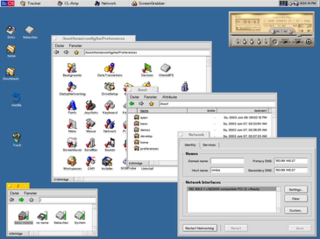
BeOS is a discontinued operating system for personal computers that was developed by Be Inc. It was conceived for the company's BeBox personal computer which was released in 1995. BeOS was designed for multitasking, multithreading, and a graphical user interface. The OS was later sold to OEMs, retail, and directly to users; its last version was released as freeware.
The editor war is the rivalry between users of the Emacs and vi text editors. The rivalry has become an enduring part of hacker culture and the free software community.
An integrated development environment (IDE) is a software application that provides comprehensive facilities for software development. An IDE normally consists of at least a source-code editor, build automation tools, and a debugger. Some IDEs, such as IntelliJ IDEA, Eclipse and Lazarus contain the necessary compiler, interpreter or both; others, such as SharpDevelop and NetBeans, do not.

A text editor is a type of computer program that edits plain text. Such programs are sometimes known as "notepad" software. Text editors are provided with operating systems and software development packages, and can be used to change files such as configuration files, documentation files and programming language source code.
TECO, short for Text Editor & Corrector, is both a character-oriented text editor and a programming language, that was developed in 1962 for use on Digital Equipment Corporation computers, and has since become available on PCs and Unix. Dan Murphy developed TECO while a student at the Massachusetts Institute of Technology (MIT).
A resource fork is a fork of a file on Apple's classic Mac OS operating system that is used to store structured data. It is one of the two forks of a file, along with the data fork, which stores data that the operating system treats as unstructured. Resource fork capability has been carried over to the modern macOS for compatibility.
A filename extension, file name extension or file extension is a suffix to the name of a computer file. The extension indicates a characteristic of the file contents or its intended use. A filename extension is typically delimited from the rest of the filename with a full stop (period), but in some systems it is separated with spaces.

Haiku, originally OpenBeOS, is a free and open-source operating system for personal computers. It is a community-driven continuation of BeOS and aims to be binary-compatible with it, but is largely a reimplementation with the exception of certain components like the Deskbar. The Haiku project began in 2001, supported by the nonprofit Haiku Inc., and the operating system remains in beta.

Macintosh Programmer's Workshop (MPW) is a software development environment for the Classic Mac OS operating system, written by Apple Computer. For Macintosh developers, it was one of the primary tools for building applications for System 7.x and Mac OS 8.x and 9.x. Initially MPW was available for purchase as part of Apple's professional developers program, but Apple made it a free download after it was superseded by CodeWarrior. On Mac OS X it was replaced by the Project Builder IDE, which eventually became Xcode.

ResEdit is a discontinued developer tool application for the Apple Macintosh, used to create and edit resources directly in the Mac's resource fork architecture. It was an alternative to tools such as REdit, and the resource compiler Rez. For the average user, ResEdit was generally easier to use, because it used a graphical user interface. Although it had been intended to be a developer tool, power users often used it to edit icons, menus, and other elements of an application's GUI, customizing it to their own preferences.

BBEdit is a proprietary text editor made by Bare Bones Software, originally developed for Macintosh System Software 6, and currently supporting macOS.
Core Data is an object graph and persistence framework provided by Apple in the macOS and iOS operating systems. It was introduced in Mac OS X 10.4 Tiger and iOS with iPhone SDK 3.0. It allows data organized by the relational entity–attribute model to be serialized into XML, binary, or SQLite stores. The data can be manipulated using higher level objects representing entities and their relationships. Core Data manages the serialized version, providing object lifecycle and object graph management, including persistence. Core Data interfaces directly with SQLite, insulating the developer from the underlying SQL.
Extended file attributes are file system features that enable users to associate computer files with metadata not interpreted by the filesystem, whereas regular attributes have a purpose strictly defined by the filesystem. Unlike forks, which can usually be as large as the maximum file size, extended attributes are usually limited in size to a value significantly smaller than the maximum file size. Typical uses include storing the author of a document, the character encoding of a plain-text document, or a checksum, cryptographic hash or digital certificate, and discretionary access control information.

TextMate is a free and open-source general-purpose GUI text editor for macOS created by Allan Odgaard. TextMate features declarative customizations, tabs for open documents, recordable macros, folding sections, snippets, shell integration, and an extensible bundle system.

Smultron is a text editor for macOS that is designed for both beginners and advanced users, named after the Swedish word for the woodland strawberry.

SlickEdit, previously known as Visual SlickEdit, is a cross-platform commercial source code editor, text editor, and Integrated Development Environment developed by SlickEdit, Inc. SlickEdit has integrated debuggers for GNU C/C++, Java, WinDbg, Clang C/C++ LLDB, Groovy, Google Go, Python, Perl, Ruby, Scala, PHP, Xcode, and Android JVM/NDK. SlickEdit includes features such as built-in "beautifiers" that can enhance code as you type, code navigation, context tagging, symbol references, third-party tool integration, DIFFZilla, syntax highlighting, and 15 emulations.

GNU Emacs is a free software text editor. It was created by GNU Project founder Richard Stallman, based on the Emacs editor developed for Unix operating systems. GNU Emacs has been a central component of the GNU project and a flagship project of the free software movement. Its tag line is "the extensible self-documenting text editor."






